| |
 |
AUG | SEP 2023 |
|
| |
|
|
|
| |
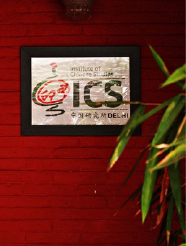 |
|
DEAR FRIENDS,
The Institute of Chinese Studies (ICS) maintained its regular activities related to disseminating informed analyses and generating debates and discussions covering a gamut of themes related to China and East Asia.
The Internship programme continues to attract fresh talent, and we receive a large number of applications. The ICS is now a popular, dynamic and interactive place for young and aspiring scholars interested in Chinese and East Asian Studies.
|
|
|
| |
|
| |
| EVENTS AND ACTIVITIES |
| |
| The ICS conducted a total of twelve events in August and September 2023: two Book Discussions, two Special Events, and eight Wednesday Seminars. |
| |
| AUGUST |
| |
| On 2 August 2023, the Institute conducted a seminar on China’s Strategies to Sustain Its Monopoly on Critical Minerals. The speaker was Ms. Neha Mishra, Associate Fellow, IndoPacific Group, Centre for Air Power Studies (CAPS), New Delhi. The speaker posited that China has employed critical minerals as geopolitical leverage on multiple occasions. She cited the example of China’s export restrictions on Gallium and Germanium, among other such elements to resource-deficient Japan. Ms. Mishra asserted that China’s strategies to secure its monopoly on these resources are diverse, ranging from investments in key global mines, especially in Africa, to building interdependence among source countries and manufacturing hubs in China, and engaging with emerging players like Myanmar, which possess vast expanses of unexploited resources. The seminar was chaired by Mr. Ravi Bhoothalingam, Honorary Fellow, Institute of Chinese Studies, Delhi. The Chair noted that China’s strategic employment of critical minerals in its policies has had a significant impact on its relations with other nations, and has contributed to the pursuit of seeking alternatives within the global supply chain apparatus. (YouTube) |
| |
| The second seminar was conducted on 9 August 2023 titled Decoding Korea’s Indo-Pacific Strategy. The speaker was Mr. Sang-Woo Lim, Deputy Chief of Mission, Embassy of the Republic of Korea, New Delhi. According to the speaker, at the core of Korea's Indo-Pacific strategy lie three fundamental pillars: freedom, peace, and prosperity. Further, Korea promotes three principles of cooperation namely, inclusivity, trust, and reciprocity in its relations with other nations. Korea's strategy is not aimed against any specific nation, especially China, but embodies the aspiration of assuming a more substantial role in the region. Mr Lim explained how Korea is supporting its neighbouring countries’ efforts toward realising their aspirations of achieving national development and economic growth. He elaborated on various programmes and initiatives undertaken by the Republic of Korea in the pursuit of this objective. He also focused on the close ties between India and Korea and argued that their shared vision is instrumental in ensuring a free and open Indo-Pacific. The session was chaired by Dr. Jitendra Uttam, Associate Professor, Jawaharlal Nehru University, New Delhi, who posited that Korea’s geopolitical importance has necessitated a comprehensive reorientation along policy lines. Korea’s Indo-Pacific strategy also reflects its growing dilemmas about balancing between the United States, on which Korea depends on for security, and China, on which Korea is economically reliant (YouTube) |
| |
| The third seminar was held on 16 August 2023 on Japan’s Energy and Climate Change Policy Challenges Since 2011: An Assessment. The speaker was Dr. Peter J. Hudson, Researcher, Institute of Global International Relations, Tokyo. Dr. Hudson’s presentation reviewed the rapid changes in Japan’s energy and climate change policies in the past decade, in the aftermath of the Fukushima nuclear power-plant accident in March 2011. It also focused on Japan's decision to “restart and rebuild” its reactor fleet, the factors which necessitated these changes and the challenges ahead in keeping up with climate and sustainability commitments, both domestically and internationally. The seminar was chaired by Dr. Shamshad Ahmad Khan, Assistant Professor, International Relations, Department of Humanities and Social Sciences, BITS Pilani Dubai Campus, UAE. Dr. Khan pointed out that although Japan intends to diversify its energy sources, the reliance on traditional sources remains dominant. Much ground needs to be covered with regard to Japan’s climate change policy. (YouTube) |
| |
| The Wednesday Seminar conducted on 23 August 2023, was titled Political Echo Chambers and Misinformation in Digital China. The speaker was Dr. Tilak Jha, Associate Professor of Journalism, Times School of Media, Bennett University, Greater Noida, Delhi-NCR. Dr. Jha expounded on how active state intervention in the social, political, cultural, and economic digital spaces is intensifying concerns, domestically and internationally, about the credibility of nearly all available information in China. Jha opined that being politically correct is not an expectation but a mandate in China. The CPC has also expanded its ability to track digital information. Under Xi Jinping, it has ensured control through stringent laws and censorship, especially on social media, as well as through the effective employment of propaganda. He also discussed the vulnerability of digital information to heightened state control due to restricted institutional scope and limited mechanisms to course correct. The seminar was chaired by Dr. Usha Chandran, Assistant Professor, Jawaharlal Nehru University, New Delhi; and, Honorary Fellow, Institute of Chinese Studies, New Delhi. Dr. Chandran highlighted the relevance of information, and how controlling its spread is linked with the CPC’s legitimacy. She also noted that the Chinese citizens are exploring new and innovative ways to voice their opinions, which are often critical of the CPC, to circumvent the restrictions on the spread of information in China. (YouTube) |
| |
| The ICS conducted a book discussion on World Upside Down: India Recalibrates its Geopolitics, authored by Ambassador Sujan R. Chinoy, Director General, Manohar Parrikar Institute for Defence Studies and Analyses (MP-IDSA), New Delhi, on 25 August 2023. According to Amb. Chinoy, the book focused on how India is dealing with a variety of regional and international challenges as it carves a new trajectory for itself in a tumultuous world that increasingly, appears “untethered and upside down.” Amb. Chinoy argued that states are now adopting a “China plus” strategy, seeking alternatives to China, given its significant economic and demographic issues. He warned that China must recognise the significance of establishing normalised borders, or else India may distance itself further. Amb. Chinoy pointed out that the relationship between India and China has never been characterised by credibility and trust, despite India's adherence to legal and diplomatic processes. In his view, although intergovernmental cooperation remained a possibility, public sentiment towards China has regressed to the levels observed during the 1962 conflict. The discussion was chaired by Mr. Ashok K. Kantha, Honorary Fellow and former Director, Institute of Chinese Studies, New Delhi; Distinguished Fellow, Vivekananda International Foundation, New Delhi. Drawing from years of experience in dealing with China, Mr. Kantha added that India needs to further develop its strategies towards China to contend with Chinese overtures in a more comprehensive manner. (YouTube) |
| |
| The fifth seminar of the month was held on 30 August 2023, on the topic Contours of the Youth Crisis in China Today. The speakers for the seminar were Amb. Kishan S. Rana, former Indian Ambassador/ High Commissioner to Algeria, Czechoslovakia, Kenya, Mauritius and Germany; Professor Emeritus, DiploFoundation, Malta and Geneva; and, Emeritus Fellow, Institute of Chinese Studies, New Delhi; and, Dr. Hemant Adlakha, Associate Professor, Centre for Chinese and South East Asian Studies, Jawaharlal Nehru University, New Delhi and Vice-Chairperson, ICS. The speakers examined the different facets of the youth crisis in China, contextualising them within the ambit of the state of the economy, the rural-urban divide, and demographic and societal trends and also offered comparisons with trends pertaining to the youth in India. Dr. Adlakha highlighted the fact that China's educated youth are increasingly compelled to accept low-wage jobs or enter the informal sector. Earlier, most of the urban unemployed youth only had high-school education, whereas today, over 70% possessed higher education degrees. Amb. Rana traced the origins of the present despondency among the Chinese youth regarding employment, back to the One-Child Policy, arguing that the crisis could be an unanticipated consequence of the same. Drawing a comparison between India and China, he noted that Indian youth are more proactive in seeking employment, even if it is low paying. The discussion was chaired by Prof. Sabaree Mitra, Chairperson and Professor, Centre for Chinese and South East Asian Studies, School of Language, Literature and Culture Studies, Jawaharlal Nehru University, New Delhi; and, Honorary Fellow, Institute of Chinese Studies, New Delhi, who also underscored the seriousness of the challenge. Given the distinct systems and historical trajectories of China and India, she inquired as to which nation is better equipped to navigate the prevailing despondency within their respective youth populations, and what strategies they might employ to confront this crisis. Both speakers concurred on the need for further research on this subject. (YouTube) |
| |
| SEPTEMBER |
| |
| On 4 September 2023, the ICS organised a Special Lecture titled, Who Is In, Who Is Out?: Urban Redevelopment, Local Identity, and Vernacular Proficiency in Shanghai. Dr. Fang Xu, Continuing Lecturer, Interdisciplinary Studies Program, University of California, Berkeley, was the speaker for this lecture. The speaker explained how the Chinese urbanities internalize, navigate the transformed urban geographical and socio-linguistic landscape and position themselves in it. Drawing on extensive fieldwork carried out in China, Dr Xu noted the mandated usage of Standard Mandarin. In this context, she highlighted the issues of identity, and popular responses in Shanghai. The lecture was chaired by Dr. Anand P. Krishnan, Fellow, Centre of Excellence for Himalayan Studies, Shiv Nadar Institution of Eminence, Delhi-NCR; and, Visiting Associate Fellow, Institute of Chinese Studies, New Delhi. (YouTube) |
| |
| On 13 September 2023, the ICS organised a seminar on Plan to Construct a Railway Line Along Aksai-Chin Road Linking Xinjiang with Tibet: Implications for Indian Security. The speaker was Col. Virendra Sahai Verma, Retd., Honorary Fellow, Institute of Chinese Studies, New Delhi. The talk focused on the implications of the railway line construction and looked at India’s options to ramp up its security and safeguard its own interests. The suggestions as mentioned by the speaker included strengthening infrastructure along its northern borders, particularly in Ladakh, diversifying transportation routes to Ladakh, and enhancing airfield capabilities in the northern plains. Taking the broader geopolitical realities into context, the speaker also suggested strengthening diplomatic ties with other regional powers such as South Korea, Japan, Taiwan, Vietnam, and Australia. The session was chaired by Mr. M V Rappai, Honorary Fellow, Institute of Chinese Studies, New Delhi. Drawing from his experience in strategic analysis, Mr. Rappai added that India needs to streamline its strategy with respect to China, and further develop its approaches toward fostering better relations with neighbouring countries. (YouTube) |
| |
| On 14 September 2023, the second Special Seminar on the topic Interpreting China’s Strategy on the Northern Borders was held. The speaker was Lt. Gen. Prakash Menon, Retd., Director, Strategic Studies Programme, and Professorial Fellow, Takshashila Institution, Bengaluru; Professor Emeritus, Trans Disciplinary University (TDU); and, Adjunct Professor, National Institute of Advanced Studies (NIAS), Bengaluru. The presentation sought to validate the hypothesis that China’s aggressive action along India’s Northern Borders is connected to its global confrontation with the US and its allies. The speaker argued that China is using the Northern Borders to create “pinch points” that can exert pressure on India’s military capabilities and divert India’s military and political energy, while keeping India confined to the sub-continent. Another objective of China’s strategy, according to the speaker, is to slow down India’s growth as a maritime power, by ensuring a constant military entanglement along the Northern Borders. The session was chaired by Amb. Vijay K. Nambiar, former Indian Ambassador; Deputy National Security Adviser of India; and, Honorary Fellow, Institute of Chinese Studies, New Delhi. Amb. Nambiar noted that India’s focus should lie on maintaining preparedness when it comes to dealing with China. Effective diplomatic overtures coupled with a comprehensive strategy remain the need of the hour. (YouTube) |
| |
| The second Book Discussion took place on 15 September 2023, on Locating BRICS in the Global Order: Perspectives from the Global South. The speakers for the session were four of the editors of the volume: Dr. Rajan Kumar, Associate Professor, School of International Studies, Jawaharlal Nehru University, New Delhi; Dr. Meenakshi Sundriyal, Assistant Professor, Centre for Spanish, Portuguese, Italian and Latin American Studies, Jawaharlal Nehru University, New Delhi; Prof. Meeta Keswani Mehra, Professor of Economics, Centre for International Trade and Development, School of International Studies, Jawaharlal Nehru University, New Delhi; and Dr. G. Venkat Raman, Professor, Indian Institute of Management, Indore. Focussing on India's role in the BRICS, the presentations explicated the possibilities of locating BRICS culturally. The dominant socio-economic trends of the BRICS countries over the last few decades were also discussed. The speakers provided a comprehensive background to BRICS as a leading organisation in the Global South, which also provided glimpses into the process of putting this diverse volume together. The ensuing question-and-answer session allowed attendees to delve deeper into the book’s themes. Dr. Kumar addressed inquiries regarding India’s role in BRICS and the competition for leadership in the global South, given China’s aspirations to challenge the US as a global superpower. Prof. Mehra explored the balance between marketdriven policy frameworks and geopolitical tensions between India and China, highlighting the ongoing debate between a Western-led democratic, rules-based system and the emergence of a unipolar world influenced by Chinese attributes and objectives. The discussion contributed to scholarly insights into the BRICS dynamics and the evolving global world order. (YouTube) |
| |
| On 20 September 2023, the Institute organised a panel discussion titled, Deciphering the Global Development Initiative: China’s New Pathway for Global South?. This seminar was the second of an ICS series on China’s three global initiatives. The first seminar, on the Global Security Initiative, was held on 28 June 2023. The speakers for this panel discussion were Ms. Samantha Custer, Director of Policy Analysis, AidData, Global Research Institute, College of William & Mary, Virginia; Ms. Anthea Mulakala, Senior Director for International Development Cooperation, The Asia Foundation; and, Ms. Linda Calabrese, Research Fellow, International Development Programme at Overseas Development Institute, London, and Leverhulme Doctoral Fellow, Lau China Institute, King’s College, London. Delving into the intricacies of the GDI, the speakers explored its goals, priority areas, and the discourse centered on relevant issues of sustainable development, as well as the expected outcomes. The panel also examined whether the GDI is an extension of the Belt and Road Initiative, or if it seeks to complement it. The session was chaired by Dr. Anand P. Krishnan, Fellow, Centre of Excellence for Himalayan Studies, Shiv Nadar Institution of Eminence, Delhi-NCR; and Visiting Associate Fellow, Institute of Chinese Studies, New Delhi. It was noted that while projects under the BRI are more driven towards China-based economic and infrastructure development projects, the GDI is more inclined towards multilateral institutions like the UN, such that it augments China’s existing aims for the Global South. (YouTube) |
| |
| The seminar on 27 September 2023 was titled The Romance of the Two Kingdoms: SinoRussian Energy Relations and was presented by Dr. Prachi Aggarwal, Assistant Professor, DEAS, University of Delhi. The seminar explored Sino-Russian energy relations, bringing the focus on the establishment of pipelines, the “oil-for-loan” schemes, and the opening-up of Eastern Siberia for Chinese investment. Dr. Aggarwal posited that energy falls within the ambit of China’s core national interests and its energy security concerns have opened new avenues for Sino-Russian partnership. Of note is the Russian government-backed Gazprom, with a focus on developing energy supply routes into North-East China. The speaker further noted that the geopolitical significance of this “romance” will have major ripple effects in international relations for a considerable period in the present and in the future. The session was chaired by Prof. Alka Acharya, Honorary Director, Institute of Chinese Studies, New Delhi; and, Chairperson and Professor, Centre for East Asian Studies, School of International Studies, Jawaharlal Nehru University, New Delhi. (YouTube) |
|
|
| |
|
| |
| PUBLICATIONS |
| |
|
Chhavi Raj, PhD researcher, Centre for Chinese and South East Asian Studies, School of Language, Literature and Culture Studies, Jawaharlal Nehru University, translated an article titled, 美国高官低调访华,为布林肯打前站,这是打算 “求和”的前 奏? Bid to setup groundwork for Blinken, a US State Department Senior official makes a low-key visit to China. Is US having a change of heart and ‘seeking peace’?, which was published under ICS Translations, in August 2023. Read here
|
|
 |
| |
|
Prateek Gupta, graduate student, Integrated Programme in Management, IIM Indore, authored Southeast Asia considers a Shift Away from the Dollar: Can the Renminbi take the Centre Stage?, which was published as an ICS Research Blog in the month of August 2023. Read here
|
| |
|
Chitra Nair, Research Intern, Institute of Chinese Studies, New Delhi, wrote on Media Censorship and “Queerness” in China, which was published under ICS Analysis in the month of September 2023. Read here
|
|
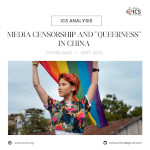 |
| |
|
Cherry Hitkari, Non-resident Vasey Fellow, Pacific Forum, USA; and NASC Fellow, Takshashila Institution, Bengaluru, translated an article titled, Lu Jingsheng: On Tsinghua University Professor Yan Xuetong saying “Patriotism need not be taught”, which was published under ICS Translations, in September 2023. Read here
|
| |
|
Chitra Nair, Research Intern at the Institute of Chinese Studies, New Delhi, reviewed a book titled, Factory Girls: Voices from the Heart of Modern China, which was published under ICS Research Blogs, in September 2023. Read here
|
|
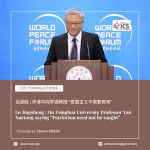 |
|
| |
|
| |
| FACULTY UPDATE |
| |
| AUGUST |
| |
|
Jabin T. Jacob, Director, Centre of Excellence for Himalayan Studies; Associate Professor, Department of International Relations and Governance Studies, Shiv Nadar Institution of Eminence, Delhi-NCR; and, Honorary Fellow, Institute of Chinese Studies, New Delhi, was a panelist in a session titled, “How is Chinese Expansionism Secured by the One China Policy?” as part of the Weaponisation of the One China Policy, organised by the Forum for Non-Violent Alternatives, on 1 August 2023. He also participated as a panelist in a session titled, “Promoting Regime Interests: The Communist Party of China’s Foreign Policy in Africa”, under China-Africa Relations: Prospects and Risks, as part of the Roundtable Series on China’s Foreign Policy in Europe and Africa, organised by the Ananta Centre in partnership with the Centre for Contemporary China Studies, on 3 August 2023.
|
|
| |
|
Zorawar Daulet Singh, Adjunct Fellow, Institute of Chinese Studies, New Delhi, delivered a lecture on “India-China Relations”, as part of a training programme for Indian Defence Attachés, at the Foreign Service Institute, Ministry of External Affairs, Government of India, on 8 August 2023.
|
|
|
Rama V. Baru, Professor, Centre of Social Medicine and Community Health, Jawaharlal Nehru University, New Delhi; and, Honorary Fellow, Institute of Chinese Studies, New Delhi, chaired a meeting on “Understanding the Public-Private Mix of Health and Social care for Older Persons”, at the India International Centre, New Delhi, on 28-30 August 2023.
|
|
|
| |
| SEPTEMBER |
| |
| Jabin T. Jacob, Director, Centre of Excellence for Himalayan Studies; Associate Professor, Department of International Relations and Governance Studies, Shiv Nadar University, Delhi-NCR; and, Honorary Fellow, Institute of Chinese Studies, New Delhi, was a panelist in a discussion titled, “The Communist Party of China’s Foreign Policy in the Indian Ocean: Implications for India's Maritime Strategy” as a part of the Analysing Response-Options of Middle Powers to China’s Maritime Power-Play within the Indo-Pacific session organized by the National Maritime Foundation, New Delhi on 11 September 2023. He was also a panelist in “The Implications of China’s Science and Technology Cooperation in the Maritime Domain” discussion for Rule-based International Order and International Cooperation in the South China Sea session organized by the Department of Political Science & Center for China Studies, National Taiwan University on |
|
| 26 September 2023. Dr. Jacob also delivered a lecture on “Understanding China’s Political System: Ideology, Structure and What it Means for the World” for the Naval Higher Command Course at the Naval War College, Goa on 4 September 2023, and on “Thinking Critically about Geopolitics and Non-Traditional Security in South Asia” as a part of the South Asian Futures Fellowship Programme 2023 at the Council for Strategic and Defense Research on 9 September 2023. |
| |
| Bhim Subba, Assistant Professor, Department of Political Science, University of Hyderabad and Visiting Associate Fellow, Institute of Chinese Studies (ICS), delivered a talk on "Signaling Loyalty: How Local Leaders are Becoming Risk Averse," in Global Conference on New Sinology (GCNS) which was held on 25-26 September 2023, in New Delhi. |
|
|
| |
|
| |
| MEDIA UPDATE |
| |
 |
| |
| Jabin T. Jacob on China’s Influence Operations. |
| |
|
Read more >
|
|
 |
| |
| Jabin T. Jacob on When a Chinese Scholar Asked Pakistan to Learn from India. |
| |
|
Read more >
|
|
|
| |
 |
| |
| Rajiv Ranjan on How BRICS will Impact the Future of Trading World. |
| |
|
Read more >
|
|
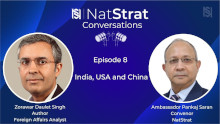 |
| |
| Zorawar Daulet Singh on India, US and China. |
| |
|
Read more >
|
|
|
| |
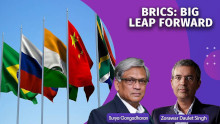 |
| |
| Zorawar Daulet Singh on BRICS Opens Doors To New Members, Modi Moots Space Initiative. |
| |
|
Read more >
|
|
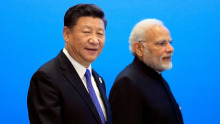 |
| |
| Jabin T. Jacob on Xi Jinping Skipping G20 Summit says a lot about how China sees India. |
| |
|
Read more >
|
|
|
| |
 |
| |
| Jabin T. Jacob on How to Read the Churn in Chinese Politics. |
| |
|
Read more >
|
|
 |
| |
| Anand P. Krishnan on China's Message Through its Downgraded Role at G20 Summit in Delhi. |
| |
|
Read more >
|
|
|
| |
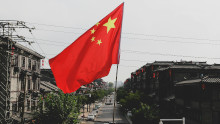 |
| |
| Anand P. Krishnan on Social Stability Through Cultural Flattening: Xi's Message in Xinjiang. |
| |
|
Read more >
|
|
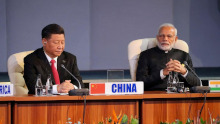 |
| |
| Bhim Subba on China's Charm Offensive for India. |
| |
|
Read more >
|
|
|
| |
| |
|
| |
| COMING UP |
| |
| |
| 16TH AICCS: |
| |
| Theme: Social Dynamics & Political Responses in China |
| |
|
|
| |
|
|
| |
| 15TH GIRI DESHINGKAR MEMORIAL LECTURE |
| |
Speaker: Tongdong Bai, Dongfang Chair
Professor of Philosophy, Fudan University,
Shanghai |
| |
|
|
| |
|
|
|
| |
|
|
|
| |
You’re receiving this e-mail because you are subscribed to the newsletter.
Was this e-mail forwarded to you? Sign up . |
| |
|
|
| |
| WWW.ICSIN.ORG |
| |
|
|
| |
|
| |
|